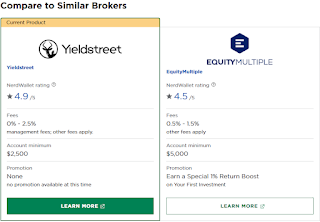YieldStreet Review April 2023
Are you seeking to diversify your investment portfolio? Consider YieldStreet, an innovative and independent online investment platform that offers accredited investors access to a range of alternative investment opportunities.
This article will explore YieldStreet's investment products and how the platform operates.
What is YieldStreet?
YieldStreet is an independent online investing platform that bringing together accredited investors with a variety of alternative investment options. YieldStreet's platform, which was founded in 2015, aims to liberalise access to financial products that were previously only available to institutional investors and high-net-worth people.
How does YieldStreet work?
To invest with YieldStreet, investors must first create an account and complete a verification process to confirm their accredited investor status. Once verified, investors can browse the platform's investment opportunities and choose to invest in one or more of the available products.
Each investment opportunity on YieldStreet is unique, but most investments are structured as debt investments, where investors lend money to borrowers and receive interest payments on their investment. YieldStreet carefully selects each investment opportunity and conducts due diligence to ensure that the investments are of high quality and have the potential to generate attractive returns.
Investments on YieldStreet typically have a minimum investment amount, which can range from $1,000 to $10,000 or more, depending on the investment product. Investors can choose to invest in individual opportunities or create a portfolio of investments to diversify their holdings.
What are the investment products offered by YieldStreet?
YieldStreet offers a diverse range of alternative investment products. Here's a closer look at the investment products offered by YieldStreet:
Real Estate: Investors can invest in real estate projects, including residential and commercial properties, structured as debt investments.
Art Finance: This investment product allows investors to lend money to art collectors, who use the funds to purchase art. Investors earn interest on their investment, and the art serves as collateral for the loan.
- Commercial Loans: Investors can invest in commercial loans, typically extended to small and medium-sized businesses and secured by the assets of the borrower. Investors receive interest payments on their investment.
- Legal Finance: Investors can lend money to law firms and plaintiffs in legal disputes. These investments provide funding for legal expenses, and investors receive interest on their investment.
- Marine Finance: These investments are structured as loans to boat and yacht owners, and investors receive interest payments on their investment.
- Private Business Credit: Investors can invest in private business credit, providing funding to small and medium-sized businesses that may have difficulty obtaining traditional financing. Investors receive interest payments on their investment.
- Residential Loans: These loans are extended to homeowners and are secured by the property. Investors receive interest payments on their investment.
What are the risks of investing with YieldStreet?
Investing with YieldStreet involves risks, as with any investment. It's important for investors to carefully consider the risks associated with each investment opportunity before investing. Some of the risks associated with investing with YieldStreet include the risk of default, illiquidity risk, market risk, interest rate risk, and credit risk. Investors should carefully review the risks associated with each investment opportunity and consider their own risk tolerance before making a decision to invest with YieldStreet.
Pros and Cons of Yieldstreet
Pros
Real estate, commercial, marine, legal, and art investments are also available.
Individuals' ability to invest in private structured credit arrangements.
Asset-backed investments that may give some protection in the case of a default.
Cons
Investing in highly illiquid assets.
Most investments are only available to accredited investors.
There are only a few options accessible.

No comments:
Post a Comment